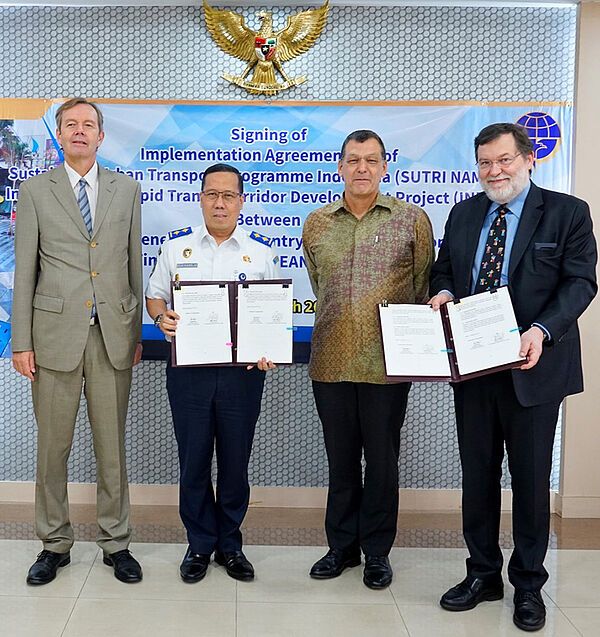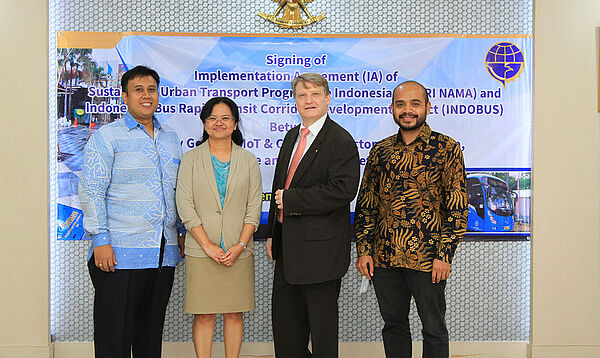Indonesian Ministry of Transport and GIZ Indonesia signed Implementation Agreement

H.E. Michael von Ungern-Sternberg (German Ambassador to Indonesia), Pak Sugihardjo (Secretary General of Ministry of Transportation), Martin Stottele (Head of Develoment Cooperation SECO in Jakarta), Peter Palesch (Country director GIZ).
On Monday, December 18th, 2017, the Ministry of Transportation (MoT) and the Deutsche Gesellschaft für Internationale Zusammenarbeit (GIZ) GmbH witnessed by the Ambassador of the Federal Republic of Germany to Indonesia, ASEAN and Timor-Leste and Head of State Secretariat for Economic Affairs (SECO) for Indonesia, signed an implementation agreement for the implementation of NAMA Support Project, Sustainable Urban Transport Programme Indonesia (SUTRI NAMA) and the project component Indonesian Bus Rapid Tran.
The cooperation will facilitate the development of sustainable urban transport programme in Indonesia in order to achieve greenhouse gas (GHG) emissions target within the context of Nationally Appropriate Mitigation Action (NAMA). SUTRI NAMA aims at cities in Indonesia to contribute to climate change mitigation through sustainable transport policies and infrastructure projects supported by a national urban transport program. While INDOBUS will support urban area in Indonesia to develop Bus Transit System as the backbone for sustainable urban mobility systems.
The NAMA Facility’s contribution to SUTRI NAMA amounts to EUR 14 million and will promote the development of sustainable urban transport measures with potential support from other donors and financial institution such as the World Bank. The national counterparts, MoT, BAPPENAS, and local governments contribute EUR 17 million.
GIZ supports the Transport NAMA with the NAMA Support Project “Sustainable Urban Transport Programme Indonesia”, offering technical and financial assistance. The project is funded by the German Federal Ministry for the Environment, Nature Conservation, Building and Nuclear Safety (BMUB) and the British Department for Business, Energy & Industrial Strategy (BEIS).
SUTRI NAMA becomes the first supported NAMA implemented in Indonesia
In 2009, the Government of Indonesia committed to a 26% greenhouse gas reduction by 2020 from ‘business as usual’ baseline levels, and to 41% with international support. Transport is the third largest source of energy-related CO2 emissions in Indonesia (23%; equivalent to 68 Mt CO2eq in 2005). Due to strong urbanisation and motorisation trends, transport has become a significant challenge for cities in Indonesia. Its car-oriented development is exacerbating air pollution, creating massive congestion and decreasing the quality of life. However, most cities have lack capacity, policy guidance and access to sufficient financial resources to develop sustainable urban transport systems.
To safeguard urban development, to create urban liveability and to provide the preconditions for economic prosperity, integrated sustainable transport solutions need to be developed, including convenient and affordable public transport and improved infrastructure facilities for pedestrians and cyclists, targeting at reduced energy consumption and CO2 emissions. This needs to be supported by establishment of a clear national urban transport policy, a further development of financing structures for large investments in public transport infrastructure, a redefinition of the role of transport planning agencies and their responsibilities, as well as further optimized public transport regulation and operation of urban transport systems. A new understanding of integrated urban development and mobility planning, presumably through establishment of Urban Mobility Plans for cities and agglomerations, to be jointly developed with stakeholder involvement needs to be sought.

